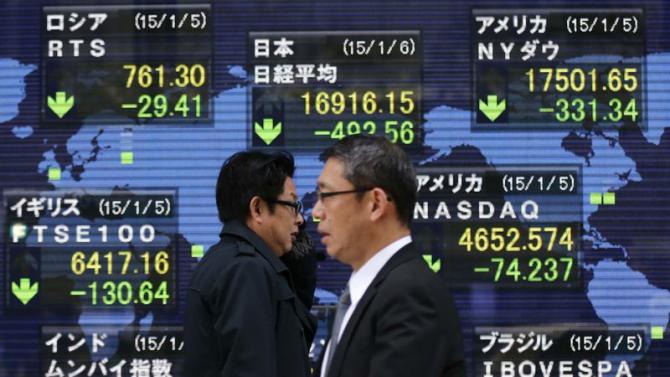Asia hurt by continuing slide in oil, dollar on defensive
January 12, 2015
By Shinichi Saoshiro
TOKYO (Reuters) – Asian stocks slipped on Tuesday as a continuing slide in crude oil prices dampened risk appetite, while the dollar nursed losses against the safe-haven yen.
MSCI’s broadest index of Asia-Pacific shares outside Japan (.MIAPJ0000PUS) fell 0.3 percent.
Japan’s Nikkei (.N225) dropped 1.4 percent and Australian shares (.AXJO) were down 0.9 percent.
The region’s focus was on Chinese trade data due at 9 p.m. ET, especially as recent signs of weakness in the world’s second largest economy has been central in worries over global growth.
Wall Street shares fell for a second straight session on Monday, led by a further sharp decline in energy shares as oil prices tumbled about 5 percent.
Declining oil prices added to concerns about U.S. corporate results as the release of earnings goes into full swing, with profit forecasts for S&P 500 energy companies having dropped sharply in recent months.
“Only the negative aspects of cheaper crude oil have been in focus so far, but attention could turn to its positive attributes if U.S. data on Wednesday can confirm an expansion in private consumption,” said Junichi Ishikawa, market analyst at IG Securities in Tokyo.
U.S. crude oil was down 27 cents at $45.80 a barrel after dropping well over $2 Monday to a fresh 5-1/2 year low after Goldman Sachs warned that prices would fall further and as Gulf producers showed no sign of curtailing output.
In currencies the dollar traded little changed at 118.435 yen, a haven that benefits when investors turn wary toward risk assets.
The greenback was unable to hold its ground after briefly rising above 119 yen on Monday and remains far from a 7-1/2 year peak of 121.86 struck late in December.
The dollar’s sluggishness against the yen, exacerbated by a drop in U.S. Treasury yields, helped the euro steady at $1.1831. The common currency continued to put some distance between a nine-year low of $1.1754 hit late last week.
The sell-off in equities world wide over the past few sessions has been a further boon for government debt.
The U.S. 30-year bond yield fell to a near-record low overnight, while the five-year Japanese yield touched a record low of zero percent.
Search
RECENT PRESS RELEASES
Related Post






